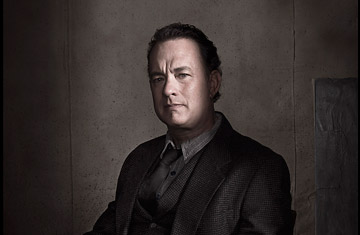
(2 of 7)
But the context for Hanks' history lessons has changed. Band of Brothers, HBO's best-selling DVD to date, began airing two days before 9/11; The Pacific, his new 10-hour epic about the Pacific theater in World War II, plays out against a very different backdrop, when the country is weary of war and American exceptionalism is a much tougher sell. World War II in the European theater was a case of massive armies arrayed against an unambiguous evil. The Pacific war was mainly fought by isolated groups of men and was overlaid by a sense that our foes were fundamentally different from us. In that sense, the war in the Pacific bears a closer relation to the complex war on terrorism the U.S. is waging now, making the new series a trickier prospect but one with potential for more depth and resonance. "Certainly, we wanted to honor U.S. bravery in The Pacific," Hanks says. "But we also wanted to have people say, 'We didn't know our troops did that to Japanese people.'" He wants Americans to understand the glories--and the iniquities--of American history. How did this shrug-prone comedic actor transform himself into our most ambitious champion of U.S. history? And how is his vision of history shaping the way the past informs and, yes, entertains us?
Island-Hopping in the Pacific
At school, all Hanks remembers learning about World War II was that Pearl Harbor was bombed by the Japanese on December 7, 1941, and that the American revenge came on August 6, 1945, when Army pilot Paul Tibbets dropped an atomic bomb from the Enola Gay on Hiroshima. For Hanks, the U.S. armed forces' island-hopping--Peleliu, Iwo Jima and Okinawa, among other bloody military engagements--was just a blur on a map that seemed impossibly exotic and faraway. "Strange to think that I've become the World War II guy," Hanks laughs. "All my friends had dads who were on the U.S.S. Nimitz or U.S.S. Enterprise or U.S.S. Coral Sea. They lived in naval housing, and everybody who was like a primary caregiver to me talked about the war. But when it came to understanding the history, I nodded off."
Hanks first comprehended just how immense his own deficit in Pacific-theater history was while making Saving Private Ryan. Around that time, novelist Nora Ephron (who wrote the screenplay for Sleepless in Seattle, which starred Hanks) sent him the two-volume, 1,882-page Library of America Reporting World War II: American Journalism (1938 to 1946) as a gift. Hanks grew intensely interested in all things related to the Pacific campaign--not necessarily the big names like Tojo or Ernest King, but the 3rd Marine Division, which was ambushed by snipers at Guam, or the intricacies of Operation Detachment at Iwo Jima. Print journalists like Robert Sherrod (on Tarawa) and Ted Nakashima (on U.S.-Japanese concentration camps) were eye-openers. "I went on a reading rampage," he recalls. "There is a fabulous book called The Fall of Japan. I got heavily into William Manchester and John Hersey."
